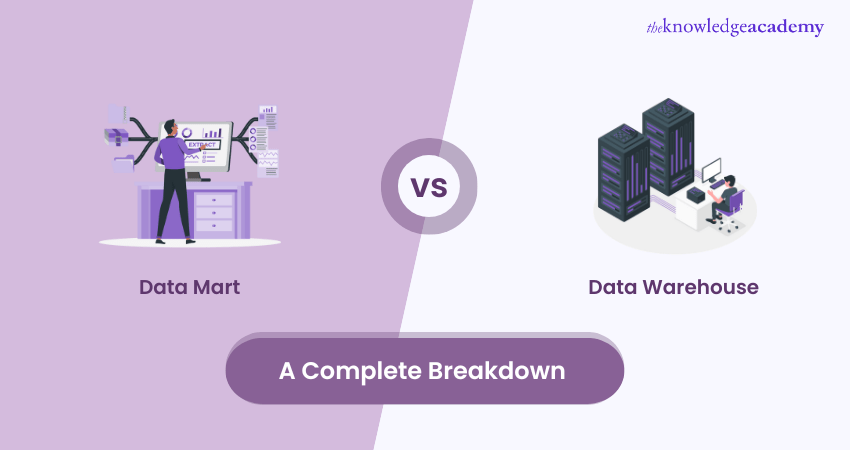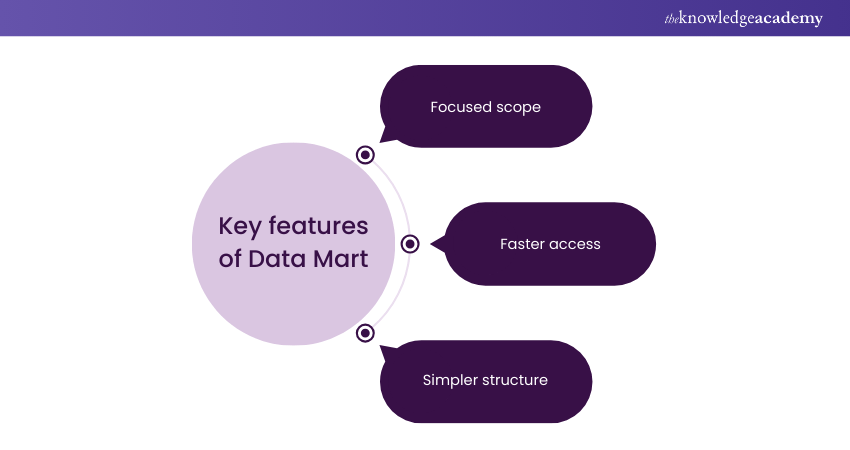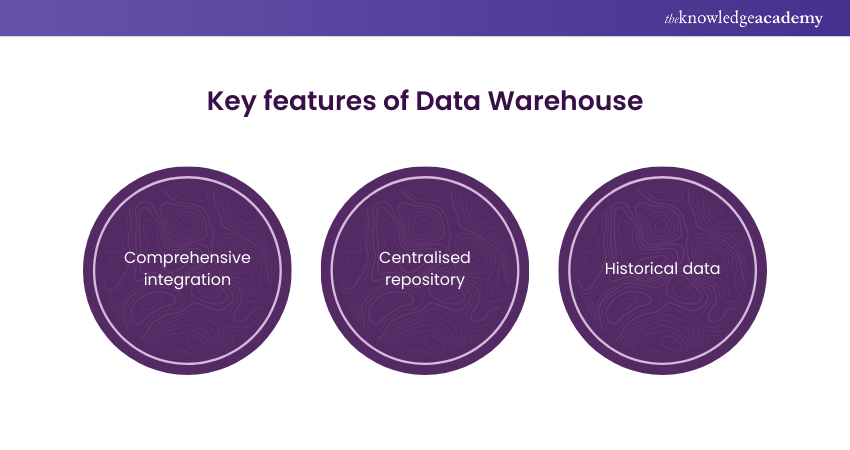We may not have the course you’re looking for. If you enquire or give us a call on +420 210012971 and speak to our training experts, we may still be able to help with your training requirements.
Training Outcomes Within Your Budget!
We ensure quality, budget-alignment, and timely delivery by our expert instructors.

When it comes to Data Mart vs Data Warehouse, the debate is not just about storage but the strategic use of data to drive business decisions. A Data Warehouse is a centralised repository that collects and stores data from multiple sources. On the other hand, a Data Mart is a subset of a Data Warehouse designed to fulfil the specific needs of a department.
The choice between a Data Mart and a Data Warehouse can greatly impact the Data Management strategy of an organisation. If you are confused about these terms, read this blog to learn the definitions, differences, and applications of Data Mart vs Data Warehouse.
Table of Contents
1) What is Data Mart?
2) What is a Data Warehouse?
3) Data Mart vs Data Warehouse
a) Definition
b) Sources of data
c) Emphasis
d) Application
e) Approach to design
f) Usage
g) Objective
h) Data handling
i) Data type
j) Subject-area
4) Conclusion
What is Data Mart?
Every company has a ton of data that is highly important to save somewhere safe to avoid data manipulation. This is where the various Data Storage Systems including Data Mart comes in handy.

A data mart possesses information about a particular business unit in an organisation. It contains a small and selected part of the data that the business stores in a larger storage system. Business entities use this system to analyse department-specific information more efficiently. It provides summarised data that can be used to make informed decisions quickly.
For example, a business firm might store data from different sources, like supplier information, orders, sensor data, employee information, and financial records in their data warehouse or data lake. However, the company stores information relevant to the marketing department, such as social media reviews and customer records, in a data mart.
What is a Data Warehouse?
A Data Warehouse or Enterprise Data Warehouse (EDW) may be defined as an organised, centralised system that businesses create for keeping critical information such as customer and sales data and access it for analytics and reporting. Moreover, it is majorly utilised for getting insights and driving decision making through Business Intelligence (BI).

A Data Warehouse usually contains not only current data but also older data that is extracted, transformed, and loaded (ETL) from different sources. Such includes both internal and external databases also. In most cases, a Data Warehouse acts as a Single Source of Truth (SSOT) by gathering data into a centralised non-volatile and standardised system that is available to relevant employees. It is designed to boost online analytical processing (OLAP) and is used for quick and effective multidimensional data analysis. Moreover, the Data Warehouses contain a large amount of summarised data, which can sometimes be several petabytes.
Learn more about Data Analytics and Big Data with our Data Warehouse Training – Sign up today!
Data Mart vs Data Warehouse
Now, let's look into the key Difference between Data Warehouse and Data Mart across various dimensions.
1) Definition
The major difference between a Data Warehouse and a Data Mart lies in their definitions. A Data Warehouse is a large, centralised repository containing data from multiple sources across the organisation. Meanwhile, a Data Mart is a smaller and more functional subset of a Data Warehouse, with its focus on a particular business unit or department.
2) Sources of data
Data Warehouses are designed to integrate data from different sources across the entire organisation. They gather information from various departments, systems, and external sources to create a singular and unified view. On the other hand, Data Marts pull data from the Data Warehouse but focus on sources relevant to a particular business unit.
3) Emphasis
A Data Warehouse offers a holistic view of the entire organisation's data, catering to executives and decision-makers who need a broad understanding of various business aspects. In contrast, Data Marts are designed to meet the particular needs of individual departments or business units.
4) Application
Data Warehouses are used for strategic decision-making at the organisational level. They support long-term business goals and provide insights into the enterprise's trends and patterns. Data Marts, being more specialised, are applied at a departmental or business unit level, supporting tactical decision-making within a specific area.
5) Approach to design
Data professionals use a top-down technique when designing a data warehouse. They first plan the overall architecture and solve challenges as they arise. However, when it comes with a Data Mart, the data scientist already knows details like values, data types, and external data sources. Therefore, they can plan the implementation from the beginning and take a bottom-up approach to design the Data Mart.
6) Usage
Data Warehouses are used for complex queries and analysis. It requires a broad organisational data perspective. They support complex reporting and ad-hoc analysis for executives and decision-makers. On the other hand, Data Marts are used for more focused and specific queries, catering to the needs of a particular department or group of users.
7) Objective
The major goal of a Data Warehouse is to provide a unified, historical view of the entire organisation's data. It supports strategic decision-making by offering insights into long-term trends and patterns. In contrast, Data Marts aims to meet a business unit's immediate and specific needs, enabling tactical decision-making based on current data.
8) Data handling
Data Warehouses handle large volumes of data from various sources, requiring robust infrastructure and processing capabilities. They focus on historical data and provide a platform for complex analytics. Data Marts, being more focused, handle smaller datasets specific to a business unit's requirements, allowing for more efficient data processing and retrieval.
9) Data type
Data Warehouses deal with diverse data types, including structured, semi-structured, and unstructured data. They support various data types to provide a comprehensive view of the organisation. Data Marts, however, are more focused and may deal with specific types of data relevant to a particular department or business unit.
10) Subject-area
While Data Warehouses cover a broad subject area that spans the entire organisation, Data Marts are limited to a specific subject area relevant to their business unit. This narrow focus allows Data Marts to provide more detailed and specialised insights within their subject domain.
11) Data storing
Data Warehouses store historical data for the organisation, supporting trend analysis and long-term decision-making. Data Marts, however, may store both historical and current data within the context of their specific business unit, providing a more localised view of information.
12) Data value
The value of data in a Data Warehouse lies in its ability to provide a comprehensive view of the organisation's performance and trends. Data Marts derive value from their specific insights into individual business units, contributing to more targeted and effective decision-making.
13) Scope
The scope of a Data Warehouse is enterprise-wide, covering all aspects of the organisation. It serves as the only source of truth for decision-makers at the highest levels. In contrast, Data Marts have a narrower scope, focusing on a particular business unit's specific needs and operations.
14) Size
Data Warehouses are typically more giant, both in terms of data volume and infrastructure requirements. They are designed to handle the entire organisation's diverse and extensive data needs. Data Marts, being more focused, are smaller in size and cater to the specific requirements of a particular department or business unit.
15) Implementation time
Implementing a Data Warehouse is a complex and time-consuming process due to its enterprise-wide scope and the need to integrate data from various sources. In contrast, Data Marts can be implemented more quickly, as they are focused on a specific business unit and require a narrower scope of data integration.
Here is a table illustrating the above differences in a concise form:
|
Aspect |
Data Mart |
Data Warehouse |
|
Definition |
A subset of a data warehouse focused on a particular area. |
A large repository of integrated data from various sources. |
|
Sources of data |
Specific to departments or business areas. |
Multiple sources across the entire organisation. |
|
Emphasis |
Targeted analysis and reporting for specific business units. |
Broad analysis and reporting across the organisation. |
|
Application |
Used by individual departments like sales, finance, etc. |
Used across the organisation for comprehensive data analysis. |
|
Approach to design |
Bottom-up, focused on specific needs. |
Top-down, encompassing entire organisational data. |
|
Usage |
Tactical decisions and specialised queries. |
Strategic decisions and broad, organisation-wide queries. |
|
Objective |
To provide department-specific insights and improve efficiency. |
To provide a holistic view of organisational data for better decision-making. |
|
Data handling |
Handles a smaller volume of data. |
Handles large volumes of integrated data. |
|
Data type |
Often structured and less diverse. |
Structured, semi-structured, and unstructured data. |
|
Subject-area |
Single subject area or a few related areas. |
Multiple subject areas across the organisation. |
Stay at the forefront of Big Data with our Big Data Analysis Course – Join today!
Conclusion
The selection between Data Mart and Data Warehouse is based on the organisation's requirements and the nature of the insights. While Data Warehousing offers a broad, enterprise-wide solution, Data Mart provides a narrow, department-focused solution. These differences, covered in this blog, are crucial for a business to understand in its effort to optimise data infrastructure.
Explore the realm of Data Analytics with our Advanced Data Analytics Certification Course – Join today!
Frequently Asked Questions

Yes, it is possible to have a Data Mart without a Data Warehouse. Data Warehouses provide a centralised and integrated view of an organisation's data. At the same time, a Data Mart can be independently implemented to cater to the needs of a business unit without a Data Warehouse.

The advantages of a Data Mart over a Data Warehouse include greater agility and quicker implementation. Data Marts are more focused on serving specific business units, which results in faster development cycles and easier adaptation to evolving business requirements.

The Knowledge Academy takes global learning to new heights, offering over 3,000 online courses across 490+ locations in 190+ countries. This expansive reach ensures accessibility and convenience for learners worldwide.
Alongside our diverse Online Course Catalogue, encompassing 19 major categories, we go the extra mile by providing a plethora of free educational Online Resources like News updates, Blogs, videos, webinars, and interview questions. Tailoring learning experiences further, professionals can maximise value with customisable Course Bundles of TKA.

The Knowledge Academy’s Knowledge Pass, a prepaid voucher, adds another layer of flexibility, allowing course bookings over a 12-month period. Join us on a journey where education knows no bounds.

The Knowledge Academy offers various Big Data and Analytics including Big Data Analysis, Data Warehousing Training, etc. These courses cater to different skill levels, providing comprehensive insights into Big Data Training.
Our Data Analytics and AI blogs cover a range of topics related to cloud computing courses, offering valuable resources, best practices, and Data Analysis insights. Whether you are a beginner or looking to advance your Big Data skills, The Knowledge Academy's diverse courses and informative blogs have you covered.
Upcoming Data, Analytics & AI Resources Batches & Dates
Date
 Introduction to Database Training
Introduction to Database Training
Fri 21st Feb 2025
Fri 25th Apr 2025
Fri 20th Jun 2025
Fri 22nd Aug 2025
Fri 17th Oct 2025
Fri 19th Dec 2025







 Top Rated Course
Top Rated Course



 If you wish to make any changes to your course, please
If you wish to make any changes to your course, please


